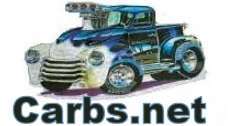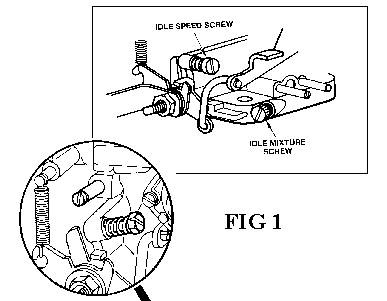|
It is important to follow all linkage and lever installation instructions. The number one and two reasons for tuning errors are improper linkage installations and over tightened linkage nut, causing a binding in linkage assembly.
CALIBRATIONS MAY VARY DUE TO REGIONAL FUELS AND STATE OF ENGINE TUNE AND
PERFORMANCE. POOR RUNNING QUALITY DOES NOT MEAN A DEFECT IN THE CARBURETOR. AN
ADVANTAGE OF THE WEBER CARBURETOR IS ITS EASE OF ADJUSTMENT AND TUNING.
SET UP ADJUSTMENTS
Start set up by confirming carb base line settings. Do not depend on the factory delivered settings. Check them before the carb is installed.
1. All settings are done with choke disengaged or warmed up so that the choke is fully opened and disengaged. This is done on automatic choke carburetors by first opening the choke butterfly by hand and inserting a wood block or wedge of some kind to hold open while the linkage is cycled (linkage operated through its full movement) to clear the choke cam. (You will hear a metallic click as the cam is released. You can check the fast Idle screw under the choke assembly to confirm that it is not in contact with the choke fast idle cam.)
2. Set the Idle stop screw (speed screw see fig 1) by backing out the Idle speed screw until it is not in contact with the throttle stop lever. Cycle the linkage again to be sure that the linkage comes to close without any assistance. (Checking for linkage bind) Now bring screw back into contact with the lever and continue to open or screwing in 1 turn no more than 11/2 turns.
3. Set the mixture screw (see Fig 1) by first screwing in until the screw stops, bottoms out. DO NOT FORCE
OR BIND AS THIS WILL CAUSE DAMAGE TO THE SCREW AND IT’S SEAT IN THE BODY OF
CARBURETOR. Back out the screw 2 full turns.
4. TUNING
BE SURE TO FOLLOW THE NEXT INSTRUCTIONS IN THE PROPER SEQUENCE, DEVIATION WILL
CAUSE THE CARBURETOR TO NOT FUNCTION TO ITS IDEAL SPECIFICATIONS AND MAY NOT
PROVIDE THE PERFORMANCE AND FUEL ECONOMY AS DESIGNED.
4a. Start the engine, the engine will run very slowly more like a tractor. As long as the engine stays running idle
speed is not important at this point.
4b. The first thing to do is not set up the idle speed, but to set the idle mixture screw to lean best idle setting.
First, turn in the mixture screw until the engine dies or runs worse, then back out the screw (recommend turning
¼ to ½ turn at a time). The engine should pick up speed and begin to smooth out. Back out ½ turn more, or until
the screw does nothing or runs worse then turn back to the point where it ran its best.
Use your ear, not a scope or tuning instruments at this point. You want to tune the engine by sound. Adjust to
best, fastest and smoothest running point.
4c. Now that the mixture screw is at its best running location, you can adjust the idle speed the screw. The
screw will be sensitive and should only take ¼ to ½ turns to achieve the idle speed you like.
Check and set idle to your driving preference. Put the car in gear and apply slight load, (AC on) and set the Idle
as you like it. Don’t set it too high, as this will cause causes excessive clutch and brake wear. The Idle only
needs to be 7 to 900 RPM with light load or AC on.
5. Recheck timing and vacuum hook ups. Recheck mixture screw to lean best idle again. If all is still best and
smoothest idle then confirm and note the final settings.
To confirm settings with the engine running. Start by screwing in the mixture screw and count the number of
turns it takes to bottom out and note if the engine dies. If Idle Mixture screws are with in ½ turn of base line
setting then all is well and have fun. Also check the speed screw and note how many total turns from initial
contact. You may have opened (turned in) the speed screw. Your final setting should be under 2 full turns. Reset
the screws (back in) to the best final settings (Per your notes) and go on a test drive and have fun. If the settings
are other than described then you may want to recalibrate the idle circuit (low speed circuit) to your engines
needs. This is done by following the rule of thumb BELOW.
Simple Rules for low speed calibration
If the mixture screw is more than 2 turns out then the idle jet is too lean (too small). When the mixture
screw is less than 11/2 then the Idle jet is too rich (too large). These assumptions are based on the fact that the
speed screw setting is not opened more than 11/2 turns. If the speed screw has to be opened 2 or more turns
then this is also an indication of a lean condition usually requiring greater change. At times it may appear to be
showing signs of richness or flooding it is really a lean condition. See pictures and notes in the tech 2 article
supplied in the kit instructions, view and please understand the need to keep throttle plate as near to closed as
possible so as not to prematurely expose the transition holes. This is what causes the visible rich condition, and
confirms the need to increase the jet size. JET KITS are available if needed.
EXAMPLE With the speed screw set at no more than two (2)
turns in after contact with the stop lever; and the best idle occurring with the mixture screw set at 3 turns from bottom,
indicates the need for a larger Idle jet. Achieving the best idle at under 2 turns indicates the need for a smaller idle jet.
The secret to understanding the critical nature of the carburetor set up and the advantages of a WEBER over
other carburetors is the idle circuit. Referred to as the low speed circuit by Weber, this circuit is responsible for
80% of the driving operation. This is the reason that the Weber should give a fuel economy improvement over
most factory carbs along with significant performance gains. In the worst case you should not see a significant
fuel economy loss over stock, while improving HP & Drivability.
The Weber Carburetor is a sequentially timed device to the motor like the distributor. Time taken in the setup
will provide more fun later.
If you should need to call REDLINE WEBER for technical assistance we will need to know your final settings to
help. Technical assistance is free for the first 60 days of purchase. Units in service over 60 days may be
assessed a service fee. All charges will be noted up front after a brief consultation to determine any possible
defect. If the carb is out of the warranty period and no defect is determined we will estimate the possible cost of
tech support or recommend literature available that may help.
ALL WARRANTIES ARE HANDLED DIRECTLY THROUGH REDLINE WEBER NOT THE RETAILER. DO
NOT SEND PARTS TO MANUFACTURER WITHOUT CALLING FOR TUNING CONSULTATION AND
WARRANTY CONFIRMATION OR INSPECTION RETURN AUTHORIZATION. PARTS RETURNED WITHOUT
AUTHORIZATION NUMBERS WILL BE REFUSED AND RETURNED FREIGHT COLLECT.
PARTS RETURNED FOR INSPECTION AND WARRANTY CONSIDERATION AND NOT FOUND TO BE
DEFECTIVE WILL BE CHARGED A MINIMUM INSPECTION AND ADJUSTMENT CHARGE OF $35.00
AND RETURNED FREIGHT COLLECT.
Contact REDLINE WEBER at 1 800 733 2277 ex 7457 Monday thru Friday 8:00 to 5:00 Pacific Standard Time
Non warranty Tech support is on a fee for services basis with minimum charge of 35.00 per problem resolution.
With tech support calibration and tuning parts will be available at discount pricing as well as access to technical
support documents and mailings. |





![]()
![]()